“I believe we must show men how to engage with the female within themselves”: An interview with Alpha Who? creator Matt Franco
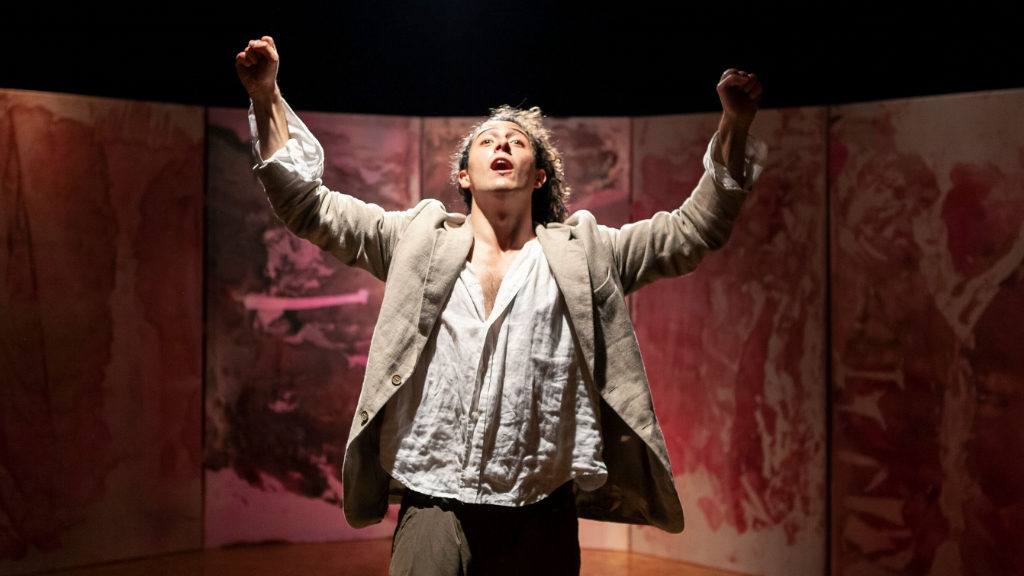
As part of the Camden Fringe 2019, Italian-born Matt Franco will be one of many having their work displayed at the Cockpit in August. Unlike others, Franco shines a light on the male mental health crisis, which often goes unnoticed, despite 84 men taking their own lives every week. Alpha Who? Challenges the perception of the alpha male through a production that is part-theatre, part-dance and part-visual art installation, taking us on an explorative journey of masculinity and vulnerability. The Upcoming caught up with Matt to discuss his mysterious work.
How would you describe Alpha Who? to those who haven’t seen a lot of immersive theatre?
Alpha Who? is not exactly a piece of immersive theatre in the traditional sense, but it can be considered one in the etymological sense of the label. It’s a piece that merges theatre, dance and visual art installation, all supported by soundscapes and music by the great Polish composer Sabio Janiak. This structure allows a constant interaction with the audience, and among them. For example, at one point I get closer to them in their seats, and I literally ask one of them to help me figure out what is happening on stage, in the room and around us all. What she/he/they understand and decipher from what they see in front of them. I reassure her/him/them that there is no right answer, creating the comfort for an open and truthful improvised interaction.
I am very sensitive to energies, so I pick the audience member that gives me the more open and available energy, ready to play with me. I don’t like when a performer pushes her/his/their energy on an audience member that doesn’t want to be involved in the piece. It is extremely important for me to respect the availability and personal space of each individual. I try to create an atmosphere where the audience immediately feels like we are sharing an exploration, I am sharing with them my research, my questions and my findings. And they cover a radical role in the moving forward of the storytelling.
So, we could say Alpha Who? allows elements of immersive theatre, revisited in a new combination of expressive forms. And even those who are not very familiar with such ways of telling a story are going to feel included and respected. Because one of the core elements of the research that led the creation process has been to create a harmonious environment between performer, performance, space and audience, bespoke to the audience of each different night.
Who is your target audience?
84 young men, between 14-35, take their own lives every week in the UK. We’re unable to approach the delicate topic of masculinity in a modern society, which suddenly expects men to be able to share their feelings and be vulnerable after generations of masculine repression.
I believe my show can speak to everyone who is directly and/or indirectly exposed to an unhealthy relationship with vulnerability. This means every young man out there, in addition to all the same-aged female individuals, parents and relatives who are exposed to his human struggles. If we are to change this, to heal wounds that men hold within themselves and that they displace mostly onto women, I believe we must first show men how to engage with the female within themselves.
I wish to target those individuals that are consciously and subconsciously craving for an example of female exploration within a male figure. I wish to speak for all the men who feel they are – or rather, must play the role due to social pressures – too macho to express their human vulnerabilities. I hope my work can give them a language to heal through, for they were never taught how to do so themselves.
What should we expect from Alpha Who?
I tend to create the type of work that I would like to see performed. I rarely see something like Alpha Who?, where different forms of artistic expression – theatre, dance, music and visual art – merge between metaphysical and extremely urban energies in the delivery of the story, which is both tragic and comic, light and dark, fast and slow, calm and hectic. Plus, it does so while dealing with extremely human topics such as vulnerability and mental health, which are very delicate, especially nowadays. The piece doesn’t hide behind a story too much, it cuts the unnecessary blah blah and goes straight to the point of the research.
One of my core work principles is to always let myself be surprised by myself and my impulses. This is one of my daily goals, especially in the rehearsal room and on stage while performing. The aim of the show is to always keep the magic of the Alpha Who? world fresh, concrete and dynamic in mine and the audience’s imagination, and openly play with the unexpected elements, be it an impulse or something that happens on stage and/or in the seats.
In this atmosphere, the ultimate aim of the show is to help the audience push their mental boundaries to something beyond what they already think, feel and know. So, every audience member goes on a personal journey according to what’s her/his/their starting point. I would like them to ponder, even for just one second, the questions I am offering. And by doing so, we can all access the story in a magic world, almost like a dream.
The performance obviously touches on a very delicate and personal subject, so did any specific event in your life inspire it? If not, then what was your inspiration?
Both events in my personal life and in those around it inspired the piece. I have been struggling with mental health issues since I was a little kid, being affected by OCD (Obsessive Compulsive Disorder), panic attacks, anxiety attacks, anger issues, bulimia and insomnia. All these elements made me question the role of life, and its worth, for a long time. I had been swinging through continuous ups and downs, and it became unsustainable. That’s when I felt the need to make this struggle the focus of my research as a human being and an artist. That’s when I started performing.
In addition to this, some beloved people got very close to suicide, and many more among my direct-indirect acquaintances managed to kill themselves. The work I have been doing for years on myself through meditation, the arts and therapy has been existentially helpful. Without it, I probably wouldn’t be here sharing my ongoing experience with you.
Further inspiration came from the discovery that I was not the only one struggling with such patterns. There still is a taboo around mental health, particularly among men, and I feel one of my duties is to contribute to get rid of this. It is extremely comforting and therefore helpful to know you are not alone in the struggle, and to know that there always is someone out there that can feel what you are, or have been, going through. Even if you are not fully sure of what it is yet.
What inspired the name Alpha Who?
I continually came across the label “Alpha Male”, and most of the time I felt it was not used in association with what I believe it means to be an alpha male. It is, in my view, a misused and overused term that creates confusion. I often wanted to ask: “What do you mean with ‘alpha male’? Who? What? Alpha who?!”.
I wanted to re-question the concept of alpha-ness from its roots. Because the dirty water down the valley can only be effectively made pure if you go to the source of it. So, from the title already, I question something that is commonly accepted, inviting the audience to re-think something put aside as a given.
The character names are very psychology-based, do you have experience with psychology?
I have been in therapy for years now, and I grew up in a family in Rome that runs one of the most important psychology and mental health publishing houses for university and post-university, the Franco Angeli Editore. I have been exposed to the concepts of conscious, subconscious and emotional expression since a very early age. In addition, when younger, I thoroughly studied the Greek tragedies in their original language, and they are among the most relevant studies on human psychology ever articulated. As we may know, Shakespeare hugely gleaned from the psychological analysis of characters by Euripides and Sophocles.
Do you relate to any of the characters?
I believe humans are like diamonds, made of multiple facets that, if lit with the right light, all shine. These different versions of characters in Alpha Who? are an attempt to give labels to some concrete thought and behaviour patterns I experience as a human being every day. These patterns, I believe, are within us all. Along with many others I don’t explicitly mention in the piece.
In my opinion, if we voluntarily let these different manifestations of humanness out in some way, then they learn to coexist. If we repress some of them, then there is the risk that they are going to bite us, claiming some attention. In my direct and indirect experience, the sooner we give attention to them the better. If Thich Nhat Hanh is right by saying that, “Attention is Love”, then we must learn to love all the different sides, both positive and negative, both dark and light, of who we are by giving attention to them.
We are always changing and morphing, and not only us humans, but all the universe. And in society today it is quite easy to fall in this unhealthy dynamic thinking that we are fixed and the same week on week. So, yes, I deeply relate to every single one of the characters, and I believe one of our life goals is to explore everyday new facets of the myriad of beings that live within us all.
What do you think the response will be? How do you want people to respond?
I shared the work-in-progress piece a few times already, once in London and a few times in Berlin, and the responses so far have been astonishingly exciting. We understand that this piece is likely to be one of those pieces that either you love, or that’s not your cup of tea. But if you happen to love it, then it looks like it can really transmit hope and courage in the human research of identity we all share, willing or unwilling.
I am an actor trained in London, between RADA and ArtsEd, and I wrote this piece out of my experience in London, for the English audience and the Western one on a wider scale. I feel this piece can have an organic, open and enriching dialogue with the city.
In Alpha Who? I try to tackle some of the reasons that I believe cause the disorientation of the citizens of the West, which I feel is related to an unhealthy relationship with vulnerability, particularly among men. I would like the audiences to leave the theatre with good food for thought. Possibly thinking that not knowing how to be in this world, sometimes, is ok. That not being sure how to live that situation, that question, that inner conflict, sometimes, is ok. Accepting this is accepting our vulnerability as human beings. And for men, in this case, it’s harder to accept this indecisive and darker side of themselves. It is seen as weak. But as Socrates used to say, “gnothi sautòn”: know thyself in your limits, accept the fact that sometimes you do not know. And it is human not to. We all go through the same inner conflicts, much more than we believe. And knowing we are not alone in this journey makes the difference from making through it and not making it to the other side.
At the end of the day, I would like the audience to leave the theatre having pondered, even just for a moment, the daily questions that are dear to me. Because something has been telling me that these questions could be dear to many more of us. What if this research can matter to you, and you, and you as well?
Do you think The Cockpit is a good venue to stage your performance?
The Cockpit is one of the most important independent theatres of the UK, and has been promoting pioneering works in their early stages for quite a long time. I think it is the perfect venue to share my piece for the first time with an English audience in the heart of London, after having tested it in Berlin. Keeping it a small audience with a short run allows the growth for an organic dialogue with the London and English audience.
Are you excited to share your creation with the world?
It’s indeed incredibly exciting to share my creation in such a way after almost three years I’ve been working on it. The aspect that excites me the most is receiving and studying the different energies I am going to get from the audience during the performances, and potentially afterwards. So far, every time I’ve shared the piece, the reactions have been very promising. Some people have thanked me for telling this story in such a way, and this is the most powerful fuel an artist can aspire to receive. I cannot wait to understand if my storytelling touches the London audience, if yes what, where, why and how. Then I can go home more informed to carry on the exploration of these topics, with the hope of getting better at contributing to these social issues.
Any future plans?
We are in chats with some producers to bring Alpha Who? to a much wider audience. From a three-week run in London to a National Tour and an Asian one between Hong Kong, Taipei and South Korea. In addition, more dates are likely to come up between Berlin and Amsterdam. And who knows, it would be great to go to the US. Last but not least, a screen adaptation is in the air. Some great directors might be interested.
So, let’s see what happens.
Regan Harle
Photo: Saverio Tonoli
Alpha Who? is at the Cockpit from 7th until 9th August 2019. For further information or to book visit the theatre’s website here.


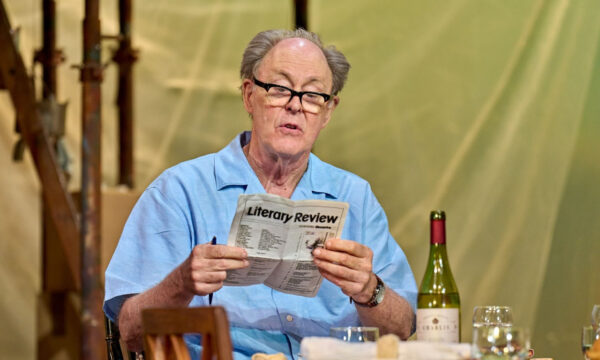
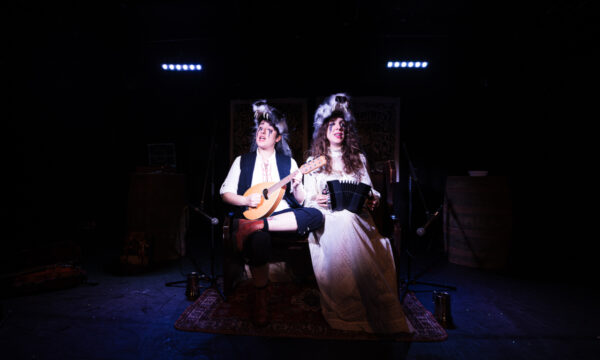

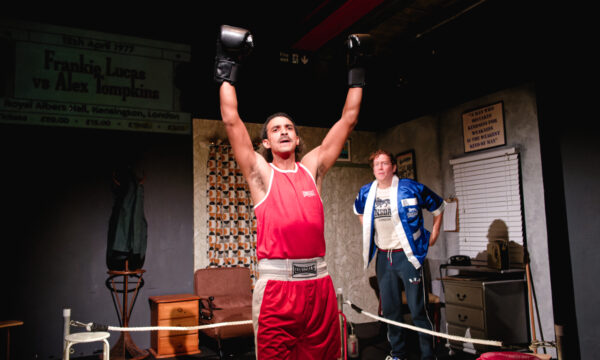
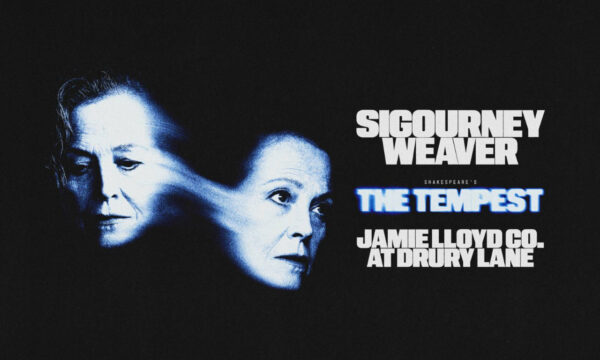

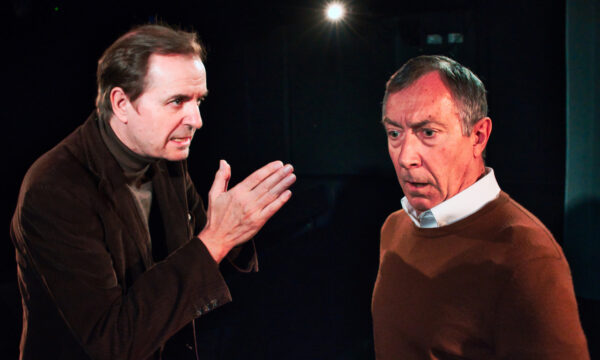

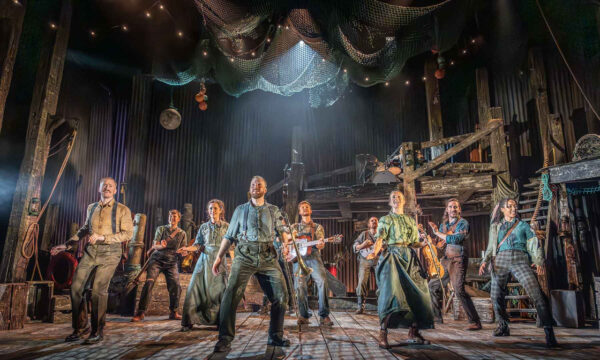









Facebook
Twitter
Instagram
YouTube
RSS